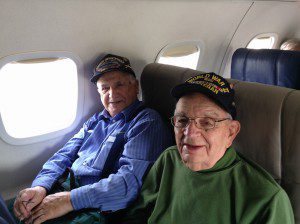
(Click to enlarge; click again to enlarge further)
My wife and I were privileged yesterday to share our brief flight from Rochester to Newark with John D. Foy (90), of Rochester, New York, and Peter B. DuPré (92), of Fairport, New York. (I have their permission to use their names and their photograph.)
Mr. Foy served in the combat infantry in General Patton’s Third Army, to which my father also belonged, and Mr. DuPré was a medic in the European theater, although I didn’t catch what unit he belonged to. (He did, I know, serve in a military hospital in England for a time.)
They were headed off for, literally, the last reunion-tour of Europe that will be sponsored by The Greatest Generation Foundation. Very few are going back this time. Relatively few are left, and they’re rapidly dying off.
We talked with them for much of the flight.
Fascinating stories. Mr. Foy even let us browse in a memoir that he had written and self-published for his grandchildren.
He told of seeing the concentration camp at Buchenwald (where my wife and I visited just a few weeks ago) the day following its liberation by another unit. The ovens, he said, were still hot. And, using the very phrase that my father often used to describe his own experience during the liberation of the camp at Mauthausen, he remembered the bodies of the dead being “stacked like cordwood.”
An amusing story told of taking a monastery in (I think) Belgium after heavy and often hand-to-hand combat. After standing guard duty, he felt his way into a pitch-black room and, to his delight, he found a large wooden box filled with straw. Perfect! He hadn’t slept in two full days. So he crawled in and fell promptly asleep. The next morning, when he awoke, he found that he’d been sleeping in an open coffin. And there were two other coffins, one on either side of him, each one containing a dead monk.
Mr. Foy and Mr. DuPré were flying to Berlin, and their tour will include visits to Nuremberg, Buchenwald, Mauthausen, Munich, and Salzburg. At Mauthausen, they’ll have dinner with survivors of that death camp. (I can only imagine how thrilled my father would have been at such an opportunity; I did have the opportunity, just once, to take him to revisit the place.)
Mr. Foy and Mr. DuPré were lively, good humored, sharp, and very articulate. (Mr. Foy had been obliged to delay his attendance at Cornell until after the war.)
One of the reasons that I feel so strongly about the continuation of human consciousness after death — it’s not, of course, an argument for the truth of the proposition, but it’s surely an argument for the desirability of its being true — is that I find the loss of such vivid personalities and of the memories of such dramatic experiences, the erasure of such richness and of such hard-won wisdom, flatly appalling.
Within at most a very few years, Mr. Foy and Mr. DuPré will join my father and many thousands of other World War Two veterans in death. The thought that the “Greatest Generation,” with all its stories and its many virtues, might simply and forever cease to exist would, if I believed it to be true, make me irredeemably sad.
Fortunately, it isn’t true.
Posted from New York City











